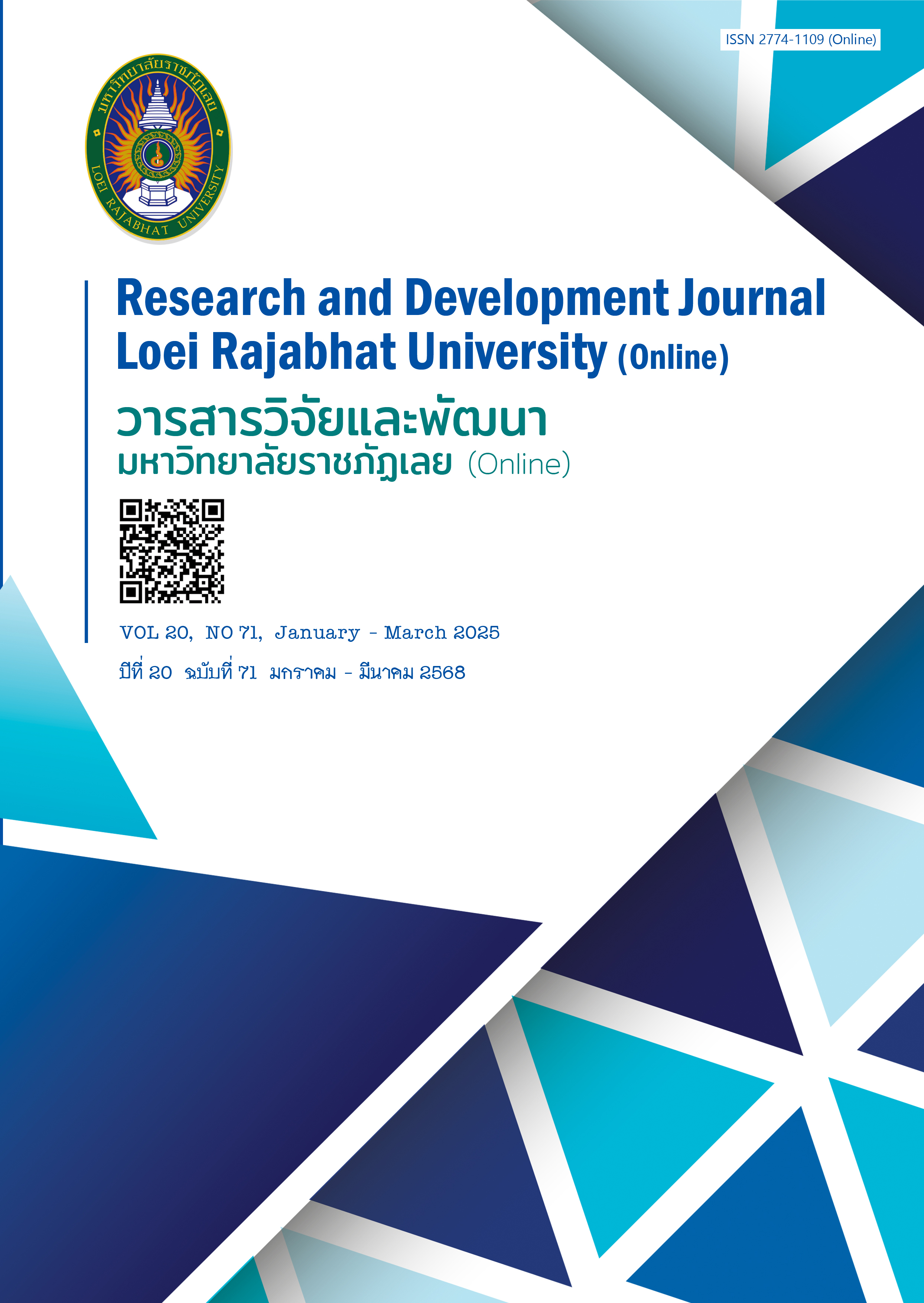บทบาทของความรู้ด้านการเงินและทัศนคติทางการเงินต่อพฤติกรรมการออม ของพนักงานบริษัทเอกชนในกรุงเทพมหานคร
คำสำคัญ:
ความรู้ด้านการเงิน, ทัศนคติทางการเงิน, พฤติกรรมการออมบทคัดย่อ
วัตถุประสงค์ของการศึกษาครั้งนี้คือ 1) ประเมินความรู้ทางการเงิน ทัศนคติ และพฤติกรรมการออมของพนักงาน และ 2) ศึกษาผลกระทบของปัจจัยเหล่านี้ต่อพฤติกรรมการออมของพนักงานบริษัทเอกชนในกรุงเทพมหานคร ใช้วิธีวิจัยเชิงปริมาณ เก็บข้อมูลจากกลุ่มตัวอย่างจำนวน 400 ราย ด้วยวิธีการสุ่มแบบตามสะดวก การวิเคราะห์ข้อมูลใช้ค่าความถี่ ค่าร้อยละ ค่าเฉลี่ย และค่าส่วนเบี่ยงเบนมาตรฐาน การทดสอบอิทธิพลของตัวแปรตามสมมติฐานใช้การวิเคราะห์ถดถอยพหุคูณด้วยโปรแกรม jamovi เวอร์ชัน 2.3 ผลการวิจัยพบว่า ผู้ให้ข้อมูลส่วนใหญ่ เป็นเพศหญิง มีอายุ 18–30 ปี สถานภาพโสด มีจำนวนคนที่อยู่ในความดูแล 1–2 คน มีรายได้และระดับค่าใช้จ่ายรวมในแต่ละเดือนอยู่ในช่วง 10,001–20,000 บาทต่อเดือน สัดส่วนเงินออมโดยเฉลี่ยในแต่ละเดือนจะออมเงินอยู่ที่ 1–10% ของรายได้ และพนักงานส่วนใหญ่ยังมีภาระหนี้ในระบบ ระดับความรู้ด้านการเงินโดยรวมอยู่ในระดับสูง ส่วนทัศนคติทางการเงินและพฤติกรรมการออมอยู่ในระดับมาก ผลการวิเคราะห์ยืนยันว่าทั้งความรู้ด้านการเงินและทัศนคติทางการเงิน มีอิทธิพลเชิงบวกอย่างมีนัยสำคัญต่อพฤติกรรมการออม โดยทั้งสองปัจจัยสามารถร่วมกันอธิบายความผันแปรของพฤติกรรมการออมได้ร้อยละ 41.2
เอกสารอ้างอิง
จิรายุ ชัยจิรวิวัฒน์. (2563). การเปิดรับข่าวสารทางการเงิน ความรู้ ทัศนคติและพฤติกรรมการออมเพื่อการเกษียณของแรงงานนอกระบบในการเข้าสู่สังคมสูงวัยอย่างสมบูรณ์ (วิทยานิพนธ์ปริญญามหาบัณฑิต). จุฬาลงกรณ์มหาวิทยาลัย, กรุงเทพฯ.
ดวงกมล สุวรรณล้วน. (2562). ความสนใจและความตระหนักรู้ในการวางแผนการออมเงินกับพฤติกรรมการออมเงินของนักศึกษาระดับปริญญาตรีมหาวิทยาลัยทักษิณ จังหวัดพัทลุง (สารนิพนธ์ปริญญามหาบัณฑิต). มหาวิทยาลัยสงขลานครินทร์, สงขลา.
ธนาคารแห่งประเทศไทย. (2566). ชุดความรู้ทางการเงินสำหรับคนวัยทำงานหรือพนักงานในสถานประกอบการ. สืบค้นจาก https://www.bot.or.th/th/satang-story/fin-d-happy-life/happy-life-resource.html
ธานินทร์ ศิลป์จารุ. (2563). การวิจัยและวิเคราะห์ข้อมูลทางสถิติด้วย SPSS และ AMOS. กรุงเทพฯ: เอส. อาร์. พริ้นติ้ง แมสโปรดักส์.
ศิวัช กรุณาเพ็ญ. (2560). ปัจจัยที่มีอิทธิพลต่อการออมและพฤติกรรมการออมของคน Gen Y (การค้นคว้าอิสระปริญญามหาบัณฑิต). มหาวิทยาลัยธรรมศาสตร์, กรุงเทพฯ.
สถาบันวิจัยประชากรและสังคม มหาวิทยาลัยมหิดล. (2565). รายงานการสำรวจคุณภาพชีวิต ความสุข ความผูกพันองค์กรของคนทำงาน (ในองค์กร) ระดับประเทศ. สืบค้นจาก https://ipsr.mahidol.ac.th/post_research/%E0%B8%A3%E0%B8%B2%E0%B8%A2%E0%B8%87%E0%B8%B2%E0%B8%99%E0%B8%81%E0%B8%B2%E0%B8%A3%E0%B8%AA%E0%B8%B3%E0%B8%A3%E0%B8%A7%E0%B8%88%E0%B8%84%E0%B8%B8%E0%B8%93%E0%B8%A0%E0%B8%B2%E0%B8%9E%E0%B8%8A%E0%B8%B5-2/
สำนักงานนโยบายและยุทธศาสตร์การค้า. (2567). อัตราเงินเฟ้อทั่วไปเดือนแรกของปี 2567 ปรับลดลงต่อเนื่องตามคาด. สืบค้นจาก https://tpso.go.th/news/2402-0000000002
Ameliawati, M., and Setiyani, R. (2018). The Influence of Financial Attitude, Financial Socialization, and Financial Experience to Financial Management Behavior with Financial Literacy as the Mediation Variable. KnE Social Sciences, 3(10), 811–832.
Bapat, D. (2020). Antecedents to Responsible Financial Management Behavior Among Young Adults: Moderating Role of Financial Risk Tolerance. International Journal of Bank Marketing, 38(5), 1177–1194
Bruhn, M., Luciana de Souza, L., Arianna, L., Rogelio, M., and Bilal, Z. (2016). The Impact of High School Financial Education: Experimental Evidence from a Large-Scale Evaluation in Brazil. American Economic Journal Applied Economics, 8(4), 256–295.
Budiono, E. (2020). Analisis Financial Knowledge, Financial Attitude, Income, Locus of Control, Financial Management Behavior Masyarakat Kota Kediri. Ilmu Manajemen, 8(1), 284–295.
Cochran, W. G. (1977). Sampling Techniques (3rd ed.). Retrieved from https://fsapps.nwcg.gov/gtac/CourseDownloads/IP/Cambodia/FlashDrive/Supporting_Documentation/Cochran_1977_Sampling%20Techniques.pdf
Cole, S., Sampson,T., and Zia, B. (2011). Price or Knowledge? What Drives Demand for Financial Services in Emerging Markets. Journal of Finance, 66(6), 1933–1967.
Haider, S., Ahmed, M., de Pablos, C., and Latif, A. (2018). Household Characteristics and Saving Motives: Application of Multinomial Logistic Regression to Examine Maslow’s Hierarchy of Needs Theory. International Journal of Applied Behavioral Economics, 7(1), 35–52.
Hayes, A. (2021). What Is the Life-Cycle Hypothesis in Economics?. Retrieved from https://www.investopedia.com/terms/l/life-cycle-hypothesis.asp
Khanal, S., Thapa, B. S., and Nepal, S. R. (2022). Determinants of personal financial planning: A survey among business graduates in Nepal. The Batuk, 8(1), 31–47.
Lusardi, A. (2012). Numeracy, Financial Literacy, and Financial Decision-Making. Numeracy, 5(1), 1–12.
Matemane, M. R. (2016). The relationship between financial literacy and saving habits: an analysis of black South Africans with a commercial tertiary education (Unpublished Dissertation). University of Pretoria, South Africa.
Mekonnen, S. (2023). The effect of financial literacy on personal financial management practices: In the case of employees of Ethiopian Civil Service University. International Journal of Financial Management, 13(1), 41–52.
Pham, K. D., and Toan Le, V. L. (2023). Nexus between Financial Education, Literacy, and Financial Behavior: Insights from Vietnamese Young Generations. Sustainability, 15(20), 14854.
Rai, K., Dua, S., and Yadav, M. (2019). Association of Financial Attitude, Financial Behaviour and Financial Knowledge Towards Financial Literacy: A Structural Equation Modeling Approach. FIIB Business Review, 8(1), 51–60.
Remund, D. L. (2010). Financial literacy explicated: The case for a clearer definition in an increasingly complex economy. Journal of Consumer Affairs, 44(2), 276–295.
Royal Bank of Canada. (2023). Why financial literacy is an important life skill for youths. Retrieved from https://www.rbcwealthmanagement.com/en-ca/insights/why-financial-literacy-is-an-important-life-skill-for-youths
Sugiyanto, T., Radianto, W., Efrata, T., and Dewi, L. (2019). Financial Literacy, Financial Attitude, and Financial Behavior of Young Pioneering Business Entrepreneurs. Advances in Economics, Business and Management Research, 100, 353–358.
Summers, L., and Gutierrez, L. D. (2018). Assessing and treating financial anxiety: The counselor as a resource, rather than referrer. The Journal of Individual Psychology, 74, 437–447.
The jamovi project. (2022). jamovi Version 2.3 [Computer Software]. Retrieved from https://www.jamovi.org.
Thung, C. M., Kai, C. Y., Nie, F. S., Chiun, L. W., and Tsen, T. C. (2012). Determinants of saving behaviour among the university students in Malaysia. Retrieved from http://eprints.utar.edu.my/607/1/AC-2011-0907445.pdf
ดาวน์โหลด
เผยแพร่แล้ว
รูปแบบการอ้างอิง
ฉบับ
ประเภทบทความ
สัญญาอนุญาต
ลิขสิทธิ์ (c) 2025 วารสารวิจัยและพัฒนา มหาวิทยาลัยราชภัฏเลย

อนุญาตภายใต้เงื่อนไข Creative Commons Attribution-NonCommercial-NoDerivatives 4.0 International License.
ข้อความที่ปรากฎในวารสารฉบับนี้เป็นความคิดเห็นของผู้เขียนแต่ละท่าน สถาบันวิจัยและพัฒนา มหาวิทยาลัยราชภัฏเลย และกองบรรณาธิการ ไม่จำเป็นต้องเห็นด้วยและไม่มีส่วนรับผิดชอบใดๆ
สถาบันวิจัยและพัฒนา มหาวิทยาลัยราชภัฏเลย ขอให้ผู้อ่านอ้างอิงในกรณีที่ท่านคัดลอกเนื้อหาบทความในวารสารฉบับนี้






